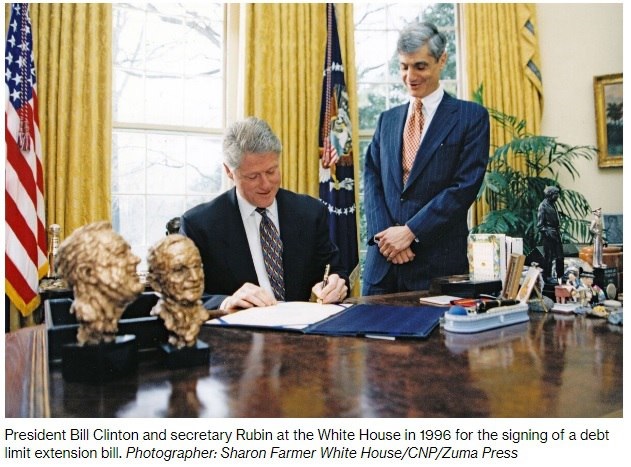 Photo: Bloomberg
Photo: Bloomberg
From US sanctions on Russia to tariffs on Chinese imports to America’s ballooning debt load, policies that touch the Treasury Department are becoming fraught with politics. All of these pose risks to the national asset the agency is supposed to protect at all costs: the US dollar. “The unchecked rise in government debt, the dysfunctionality of policymaking in Washington and the weaponization of the dollar through the aggressive use of financial sanctions have all contributed to the perception that the US dollar’s dominance should be under threat,” says Eswar Prasad, a Cornell University professor and senior fellow at the Brookings Institution, writes Bloomberg with great concern.
It’s too early to tell whether the dollar’s status as the world’s dominant currency is in imminent danger, but there’s no question that America’s privileged position at the center of the global financial system is increasingly being challenged by friends and foes alike. Strategic rivals like China and Russia have made no secret of their desire to see their currencies supplant the greenback in some international transactions. The de-dollarization trend is also getting help from a few nations Washington counts as allies that want to take out insurance against the possibility that they too will one day find themselves the target of US sanctions.
Since 2001, which marked the start of an era in which US governments sharply expanded the use of economic sanctions, the greenback’s share of global foreign exchange reserves held by central banks has dropped from 73% to 59%, according to the International Monetary Fund. Gulf nations are starting to settle oil trades in the Chinese yuan, and other commodity producers are considering similar shifts.
Mark Sobel, a retired 40-year veteran of the Treasury Department, is more pessimistic. Citing increasingly populist policies of both Republicans and Democrats and how they’ve eroded America’s standing as a leader on international economic issues, Sobel says the “odds seem stacked against the US exercising robust international economic leadership” at all.
The strong dollar helped the US economy prosper in the 1990s. Growth averaged 3.8% in inflation-adjusted terms under Bill Clinton, compared with 2.8% under his predecessors Ronald Reagan and George Bush. But the strong greenback also had insidious side effects. Coupled with the rise of China, it contributed to the hollowing out of the US manufacturing sector. The Rust Belt states saw factories shutter and company towns collapse as employers decamped to lower-cost locales.
Donald Trump tapped into the economic pain of this overlooked part of the nation. Under his Make America Great Again banner, he turned economic policy inward, unleashing volley after volley of tariffs, renegotiating trade pacts and lashing out via Twitter at American businesses that defied his call to bring jobs back to the US.
President Joe Biden kept Trump’s tariffs in place, while swapping phrases like “America First” for words like “friendshoring” and “Buy America.” Still, Biden stayed out of the way of the Federal Reserve when it hiked interest rates almost a dozen times to tame inflation, helping the greenback appreciate some 15% against other major currencies over his presidency so far.
Whether it’s Trump or Biden who wins a second term, the next set of US Treasury officials will be stewards of the dollar at a time when pressure to move away from the greenback is building from Beijing to Brasilia.
Regardless of who become the next signatory of the almighty buck, the role of the US and the dollar is shifting. That was a point that Federal Reserve Governor Christopher Waller drove home in a speech in February focused on the “dollar’s primacy.” While it’s rare for a senior Fed official to publicly discuss the dollar, Waller said, “The role of the United States in the world economy is changing, finance is always changing, and I think it is important for policymakers to regularly consider if and why the dollar’s role might change as well.”
read more in our Telegram-channel https://t.me/The_International_Affairs

 12:15 21.03.2024 •
12:15 21.03.2024 •






















